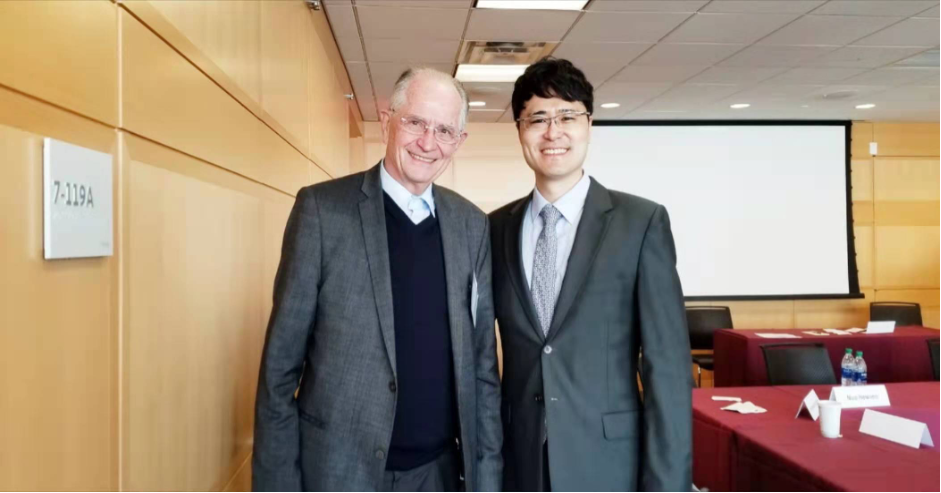STL Professor KANG Sang Yop (姜尚烨) participated in the book project, entitled Comparative Corporate Governance (Edward Elgar, 2021), which was published in 2021 summer. This book was edited by Afra Afsharipour (Professor of Law and Senior Associate Dean for Academic Affairs, University of California, Davis, School of Law) and Martin Gelter (Professor of Law, Fordham University School of Law).

Published Book: Comparative Corporate Governance (Edward Elgar, 2021)
Professor Kang contributed a chapter,Diversified Enterprises with Controlling Shareholders: A TheoreticalAnalysis of Risk-sharing, Control/Voting Leverage, and Tunneling. Other world-leading corporate law/securities regulation scholars, such as Vikramaditya S. Khanna, Klaus J. Hopt, and Assaf Hamdani, joined this book project and contributed their chapters.
In September 2019, authors met and discussed in “Research Handbook on Comparative Corporate Governance Workshop” held at Fordham University School of Law. Professor Kang presented an earlier version of his chapter and commented on an earlier version of Professor Khanna’s chapter.
The publisher introduced the book as follows. “This research handbook provides a state-of-the-art perspective on how corporate governance differs between countries around the world. It covers highly topical issues including corporate purpose, corporate social responsibility and shareholder activism.”
Professor Kang’s chapter explains various issues concerning the diversified enterprises. The following paragraphs are an excerpt of Introduction part of Professor Kang’s chapter (footnotes are omitted).
Some business entities run a single business (e.g., shoes), while others are “diversified enterprises” with a variety of businesses (e.g., shoes and clothes). For example, Dyson, a manufacturer of vacuum cleaners, tried to expand into the electric automobile industry. BYD, an electric automobile company, produces face masks and disinfectants. Disney covers various businesses such as cable and broadcast television networks, films, theme parks, resorts, cruise lines, games, books, magazines, and retailing.
A diversified enterprise can be established as a single corporation with multiple “business lines.” In this chapter, these companies are referred to as “companies operating various businesses” (COVBs). For instance, a COVB may consist of automobile frame, furniture, (home and car) audio system, and airbag business lines. Diversified enterprises can also be established as a corporate group, comprised of multiple “affiliated companies,” each of which is a separate legal person. For example, a corporate group may have automobile frame, furniture, (home and car) audio system, and airbag affiliated companies. Unlike an affiliated company in a corporate group, a business line in a COVB, without its own legal personhood, acts as a part of a legal person, a corporation.
Although many studies have examined diversified enterprises, studies which theoretically analyze the differences between COVBs and corporate groups are rare. In terms of business operations, a business line of a COVB functionally corresponds to an affiliated company within a corporate group. This chapter addresses how, despite the functional similarities of COVBs and corporate groups, the selection between a COVB form and a corporate-group form makes differences in terms of the following issues: (1) risk-sharing (cash-flow stabilization), (2) control/voting leverage, and (3) tunneling. In most countries, controlling shareholders (“controllers”) are often dominant players of large businesses, and this chapter emphasizes the analysis of controllers’ behavior and incentives when they manage diversified enterprises. In short, issue (1) relates to controllers’ efforts to manage business organizations safely. Issue (2) concerns controllers’ drive to dominate larger corporate empires. Issue (3) is associated with controllers’ schemes to gain private benefits from the corporate entities they direct.
Professor Kang is Professor of Law (full professorship with tenure) at Peking University, School of Transnational Law. He teaches and researches in the areas of corporate governance, corporate law (general theory; US; Korea; China), securities regulations, M&As, law and economics, ESG (Environmental, Social, and Governance), capital markets, financial market regulations, banking policies and regulations, startups and venture capitals, competition law (anti-trust), the 4thindustrial revolution, corporate groups, institutional investors, hedge funds and private equity funds, shareholder activism, stewardship, law and finance, executive compensation, Chinese economic policies, Chinese corporate governance, East Asian economies and legal systems, political economy, etc.

Professor Kang with Professor Klaus J. Hopt
Professor Kang holds J.S.D. (Doctor of the Science of Law) degree at Columbia University School of Law. He is also a Research Member of the ECGI (European Corporate Governance Institute), a prestigious global academic association for the corporate governance scholarship (law, economics, and finance). He is also a CFA and a FRM charter-holder.

Professor Kang with participants of the conference in New York in September 2019 (“Research Handbook on Comparative Corporate Governance Workshop”)